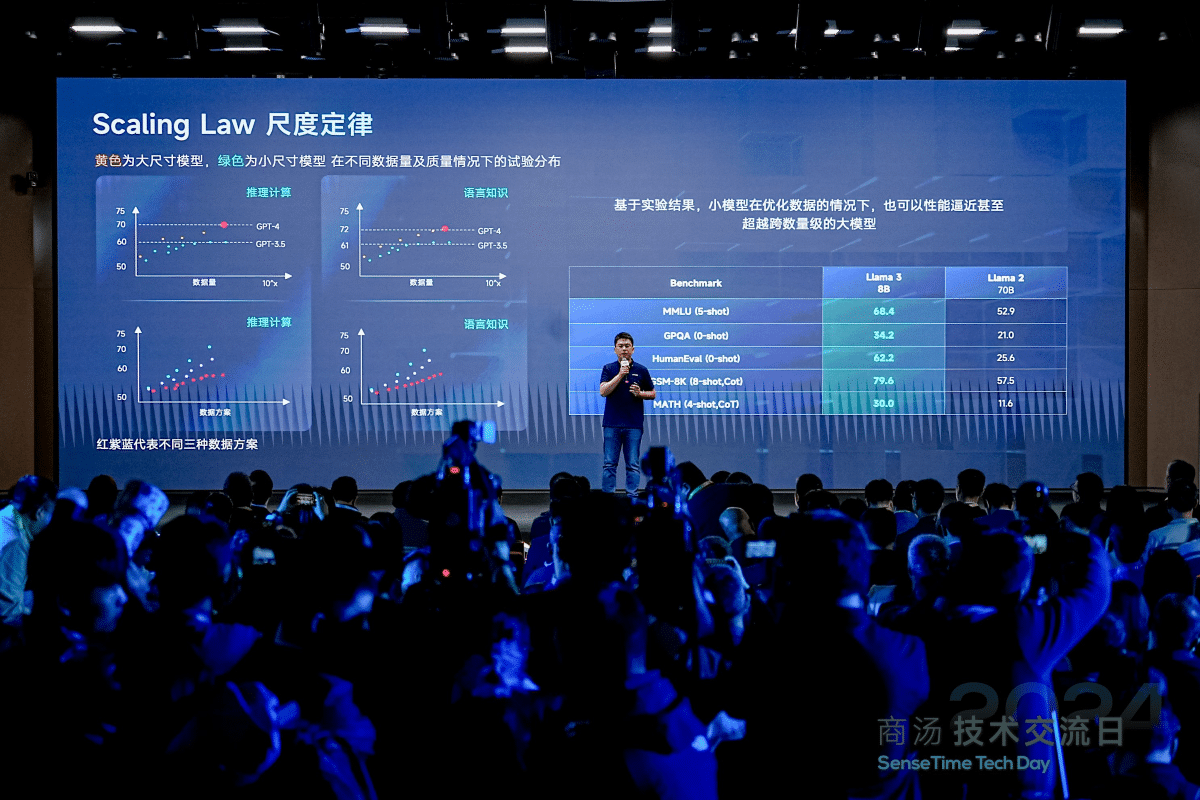SenseTime, a Chinese AI company has unveiled SenseNova 5.0, which is an update of its first LLM introduced in 2023 that it says rivals OpenAI’s GPT-4 Turbo. The announcement triggered a massive rally in SenseTime’s Hong Kong-listed shares even as they remain deeply in the red for 2024.
SenseTime unveiled the model at its Tech Day event in Shanghai yesterday and said that the major advancements relate to mathematics, reasoning, knowledge, and coding capabilities.
According to SenseTime, its SenseNova 5.0 now has best-in-class mathematical, coding, and reasoning capabilities which makes it valuable in applications in finance and data analysis.
It added, “Given the same knowledge input, it provides better comprehension, summarization, and question and answers, providing strong support for vertical applications such as education and the content industries.”
Key Takeaways: SenseTime and the AI Race
- SenseNova 5.0 Launch: SenseTime’s new AI model, SenseNova 5.0, claims to rival GPT-4 Turbo, focusing on advanced reasoning and coding capabilities .
- Stock Rally Amid Challenges: Despite financial difficulties, SenseTime shares surged following the SenseNova announcement .
- US-China AI Tensions: US chip export restrictions continue to challenge Chinese AI firms, slowing their progress despite technological advancements .

Chinese Company Unveils ChatGPT Competitor
Last year, SenseTime unveiled its chatbot named SenseChat, which performed multiple tasks like writing an email when prompted.
The company’s CEO and co-founder Xu Li said then that SenseChat is based on its big AI model SenseNova, labeling in a rival of ChatGPT.
SenseTime shares have whipsawed over the last couple of years. In January 2022, its market cap rose as high as $35 billion but the shares fell subsequently. Last week, the stock hit its record closing low and while it has since rebounded its market cap is a tad short of $3.5 billion – which is less than 10% of its all-time peak.
To put that in perspective, ChatGPT’s creator, OpenAI, is valued at over $80 billion and has secured billions of dollars in investment from Microsoft. While Chinese companies usually trade at a big discount to US-based tech rivals, it goes to show the upside potential in SenseTime if its AI model can get the better of ChatGPT.
Chinese #AI software giant #SenseTime surges over 30% in HK after it launched new version of SenseNova foundation model, which it said benchmarks agast GPT-4 Turbo launched by OpenAI in Nov.https://t.co/haGgRmRP6L pic.twitter.com/FVMxA5uB76
— YUAN TALKS (@YuanTalks) April 24, 2024
Chinese Company Comes Up with a ChatGPT Rival
Meanwhile, SenseTime’s claims of its SenseNova 5.0 rivaling OpenAI’s GPT-4 have raised eyebrows as the US has placed restrictions on exports of high-end chips to China, fearing the rise of the country’s AI industry for military and other purposes.
The United States has been leading the world in military-grade AI development. The US military has been investing heavily in AI technology, developing autonomous vehicles, drones, and other systems that can assist human soldiers in the field.
China has nonetheless been making significant strides in AI technology as well and is rapidly catching up.
The US’ chip export restrictions seem to be working as intended to hamper the country’s AI ambitions. For instance, Chinese tech giant Alibaba, which is also building its AI models, canceled the spinoff of its cloud unit, blaming the US chip export restrictions.
“The recent expansion of US restrictions on export of advanced computing chips has created uncertainties for the prospects of Cloud Intelligence Group,” said Alibaba in its release.
Other Chinese companies are also feeling the heat. Last year, Chinese tech giant Tencent said that while it has enough stockpile of Nvidia’s H800 chips (that now fall under export restrictions) “for at least a couple more generations” of its “Hunyuan” AI model, it would need to be more “efficient” with the usage.
It added, “we will also try to look for domestic sources for these training chips.”
Both US and Chinese Companies Are Hurting from US-China Tensions
The escalating tech war is impacting the fortunes of US companies as well. Nvidia, for instance, has warned that its long-term competitiveness in China – which accounted for 20% of its data center segment revenues before the ban – might be negatively impacted, and it would lose out on business in the country.
Also, despite the sanctions, Chinese companies are proceeding with technological advancements.
The most pertinent example is that of Huawei which managed a chip breakthrough despite crippling US sanctions. The company’s new smartphones are an instant hit with Chinese consumers and its soaring sales are coming at the cost of iPhone 15 sales in the country.
Meanwhile, US Commerce Secretary Gina Raimondo has downplayed Huawei’s microchip breakthrough in an interview with CBS News’ “60 Minutes.
“It’s years behind what we have in the United States. We have the most sophisticated semiconductors in the world. China doesn’t. We’ve out-innovated China“, said Raimondo in the interview.
That said, while Huawei might want the world to believe that it achieved the breakthrough through brute force, there are allegations that it managed to bypass US sanctions. It may have paid third parties an arm and a leg to get them the top-notch hardware they need under the table, but there isn’t enough conclusive evidence to say that for certain.
According to a senior Commerce Department official, Huawei’s chipmaking partner SMIC “potentially” violated US sanctions by providing an advanced chip to Huawei.
US-China AI Tech War Set to Escalate
Meanwhile, there has been an AI-fueled tech war brewing between the US and China as tech companies from both countries are striving to capitalize on the AI euphoria.
China has banned ChatGPT which is in line with the country’s long-followed practice of shunning foreign tech companies for local alternatives, likely for propaganda, data security, and isolationism.
China has domestic alternatives for platforms like Google and Facebook as the country is quite sensitive about the safety of its citizens’ data – which was reflected in the forced delisting of Didi from the US stock markets.
All said, the AI war between China and the US might only escalate in the coming months as Chinese tech companies expand their AI offerings.
If SenseTime has indeed made a “ChatGPT killer,” it would be a signal that US sanctions to thwart China’s AI capabilities are having limited effect at best.
